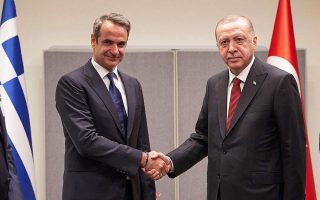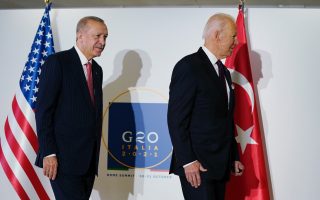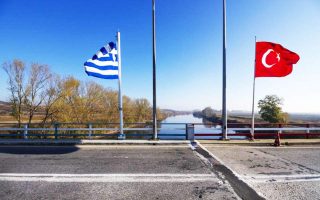Mitsotakis-Erdogan: Yes to improvement, but without threats, challenges and violations

The messages from both sides following the Mitsotakis-Erdogan meeting in Istanbul are positive. We will soon find whether they reflect reality.
It is obviously useful to have open communication channels. Also, there is, indeed, plenty that can be done to improve bilateral relations despite disagreements. This will benefit not only Greece and Turkey, but the whole East Mediterranean region.
It is also obvious, however, that no significant steps toward improvement can be taken while rhetorical threats are made by institutions such as the Turkish Parliament’s vote threatening war in case Greece makes use of its right, given by the international law of the sea, to extend its territorial waters to 12 miles.
Similarly, steps forward are hindered by actions such as the flawed, bordering on the ridiculous, Turkish-Libyan memorandum delineating maritime “borders,” the contesting of Greek sovereignty on islands, the continuing flights in Greek airspace, the opening of the occupied Cypriot city of Varosha, and incursions into Cyprus’ exclusive economic zone.
In any case, it is useful for everyone – both on the political-diplomatic level and that of each country’s public opinion – to have what is discussed and agreed upon behind closed doors reflected in public statements and, generally, the behavior of both sides.
Only in this way will the necessary trust and credibility be built, both essential ingredients for a real improvement in relations over time.
Steps can be taken to deepen economic ties and exchanges. This will help consolidate a positive climate and replace the present confrontational one that Turkey, with its stance and rhetoric, helps maintain.
There can be cooperation on issues such as creating humanitarian corridors in Ukraine and the management of migrant and refugee flows.
Following a hopefully calm summer in the Aegean, a welcome next step would be to hold the 5th Supreme Cooperation Council in Thessaloniki in the fall.
Greece does not threaten, does not put forward any claims and does not challenge either the law of the sea or international conventions and treaties. It moves on steadily, with a set compass, and proves that in the stability of its alliances. It does not vacillate.
It is incumbent upon Turkey to show that it really means to place its relations with Greece on a different footing, as it has been attempting to do lately with other important countries in the region, from the United Arab Emirates to Israel.
In this context Turkey cannot ignore an important dimension of the complicated bilateral dynamic: that Greece is a full EU member and that it has channels of influence with important global actors. These two facts, which will not go away, are another reason that it is in Turkey’s interest to have Greece as a friend and not an opponent or enemy.
The decision is Ankara’s alone: If it opts for sobriety and frank cooperation, then, together with Athens, it could indeed contribute to maintaining the security architecture in Europe, especially in its southeastern extremity.





